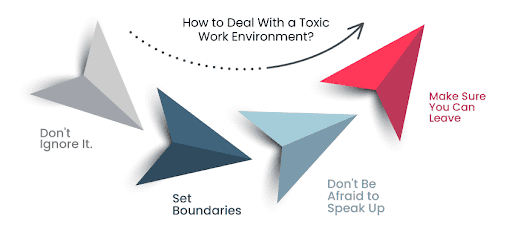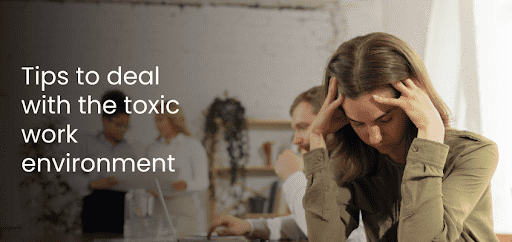Introduction
We define a toxic work environment as an environment where stress levels are high, morale is low, and productivity is low. Toxic leaders can be very harmful to your career growth. To deal with this type of situation, you need to learn how to identify toxic people in your workplace and prevent them from causing trouble.
Our Wellness Programs
What is a Toxic Work Environment?
In a toxic work environment, people feel they are not treated with respect and dignity and face issues like bullying, harassment, and intimidation. It can be an environment in which there is an absence of trust, honesty, accountability, and a sense of belonging.
If you are in a toxic work environment, you will constantly feel stressed, anxious, or angry. It can make it hard to focus on your job and forget about what’s going on outside of work.
We can characterize the environment by behaviours that intimidate or threaten others with harm or loss of job security or status. These behaviours may include threats of physical violence, sexual harassment, and discrimination. Toxic Work Environments can lead to high turnover rates, low productivity, and increased team member stress levels. Henceforth, taking action is essential if you feel your workplace is no longer a healthy place to work or stay.
Looking for services related to this subject? Get in touch with these experts today!!
Experts

Banani Das Dhar

India
Wellness Expert
Experience: 7 years

Devika Gupta

India
Wellness Expert
Experience: 4 years

Trupti Rakesh valotia

India
Wellness Expert
Experience: 3 years

Sarvjeet Kumar Yadav

India
Wellness Expert
Experience: 15 years

Shubham Baliyan

India
Wellness Expert
Experience: 2 years

Neeru Dahiya

India
Wellness Expert
Experience: 12 years
What Are the Signs of a Toxic Work Environment?
There are many symptoms of a toxic work environment, but here are five common ones:
- The relationship between a supervisor and a team member is one-sided, and it’s all about the supervisor. They don’t see you as a person but just as another member of their team who is there to help them get things done.
- Your boss or coworkers are bullying you, or you’re afraid for your job if you speak up against them.
- Your coworkers are mean to each other and make fun of each other behind their backs.
- There’s no trust between you and your supervisor; they think they can do whatever they want without fearing reprisal from you.
- You feel like there is no respect for authority figures at work. Sometimes you think that everyone goes around telling lies or behaving unprofessionally in some way that makes everyone look bad when they could easily keep it professional while still doing their job effectively.
How to Deal With a Toxic Work Environment?

-
Don’t Ignore It.
First, you need to know that ignoring a toxic situation won’t make it go away. The reason for this is simple: if you don’t address the issue head-on, it will fester and grow stronger until something happens that causes the problem to explode. In many cases, someone either quits or gets fired (or both).
-
Set Boundaries
Toxic situations often happen when people get too close or personal with their coworkers — especially in high-pressure environments. You can set boundaries by ensuring you only have time for professional interactions at work, avoiding conversations outside of work, and asking for breaks when needed.
-
Don’t Be Afraid to Speak Up.
Toxic work environments often result from people refusing to acknowledge problems in their behaviour and letting others be held accountable. If someone isn’t treating you fairly or has been disrespectful, speak up — and try not to take things personally.
-
Communicate!
Keep clear channels of communication open between your team and management. Every company has a formal Slack channel or a private email address for managers and leadership teams. Make sure everyone knows where these are and how they can use them if they need support from above.
-
Make Sure You Can Leave
If the toxic environment is so bad that you cannot perform at your best, resigning is the best option. It’s hard to find another job and get back on track when dealing with a toxic boss or coworker. However, leaving an environment that harms you and your mental health is always worth it.
How to Rebuild Your Life After a Toxic Work Environment?
Like most people, you probably don’t know how to rebuild your life after a toxic work environment. You may have even had the experience of working at a workplace that was so toxic that it made you physically ill.
1. The first step is to take time off from work. When you are in a toxic work environment, the last thing you want to do is return to it. You will be emotionally exhausted, and your stress levels will be elevated. It can lead to poor decision-making on your part and poor work performance. It’s not worth it! It would be best if you gave yourself time to heal before returning to the same environment again.
2. Often, yoga and meditation help people reduce stress. So practising yoga is essential.
3. The best way to rebuild your life after this type of situation is to seek professional help from a therapist or counsellor who specializes in helping employees deal with toxic work environments.
4. Your therapist can help you set boundaries and understand patterns where change is needed. They will be able to help you identify the areas you may need to tweak to fit into the existing environment with more capability to deal with things. And, of course, talking help. The sooner you get service, the better off you will be.
Conclusion
Toxic work environments are a common occurrence in today’s society. People are more connected than ever, so there is more opportunity for collaboration and conflict. While toxic work environments can be challenging to avoid, there are ways to deal with them and improve your life.
If you have been in a toxic work environment for a while, consider taking a vacation. It gives you time away from an unhealthy situation to think clearly and make good decisions about your future. It also gives others who may still be working with you the opportunity to change their behaviour so that they don’t cause any more harm than they already have done.
If this isn’t an option, consider changing jobs until things improve somewhat at home and work.
| [1] | L. J. Chamberlain and R. Hodson, “Toxic work environments: What helps and what hurts,” Social. Perspect., vol. 53, no. 4, pp. 455–477, 2010. |
| [2] | C. E. Z. Pickering, K. Nurenberg, and L. Schiamberg, “Recognizing and responding to the ‘toxic’ work environment: Worker safety, patient safety, and abuse/neglect in nursing homes,” Qual. Health Res., vol. 27, no. 12, pp. 1870–1881, 2017. |










